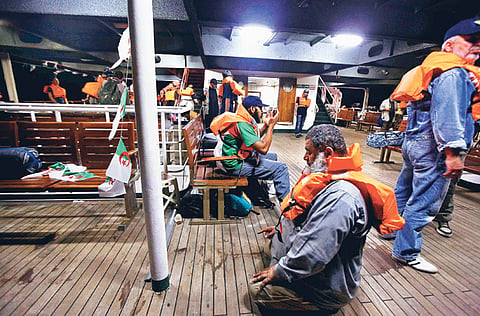Living it out on the Mavi Marmara
It was home to 550 activists aboard Freedom Flotilla's largest aid ship

Muscat: The Mavi Marmara was the largest passenger vessel in the six-ship Freedom Flotilla that attempted to deliver humanitarian aid to the blockaded Palestinian territory of Gaza last month.
Carrying over 550 passengers from up to 40 countries, the ferry was home for five days to people from a number of religions, cultures and languages.
The sleeping quarters were far from luxurious. The Marmara, originally designed as a ferry for short trips, had sofas instead of beds. Some were U-shaped and could fit four people while others were long sofas that fit approximately three.
There was confusion on the first day as to how the passengers would fit and sleep comfortably on the sofas, and arguments broke out between some contesting the same areas in the men's quarters.
One such argument took place when a number of Algerians occupied a sofa reserved by a group of Kuwaitis, who had placed their belongings on it, including a Gucci suitcase wrapped in protective plastic.
That dispute was solved with the Algerians having to find another sleeping spot, but another dispute between Westerners and Algerians forced the Westerners to move to the deck with their sleeping bags, where they slept under the stars.
After a first night in the hot sleeping quarters, many chose instead to sleep under the comfort of the Mediterranean breeze on the deck. By the second day, almost every quiet spot in every corner of the ferry was occupied by sleeping bags and mats.
One such spot was occupied by three young British men, who made a corner by the railing their spot for the entire duration of the journey. They would sleep, eat, pray, and chat in their corner. Passers-by would often join them for a smoke or a friendly wrestle.
One of the men, 21-year-old Palestinian Scotsman Ali Awaisi, was on his way to Gaza for the first time since leaving Palestine 19 years ago. Expecting to meet his Gazan aunts for the first time, he was nervous about the thought that they would not recognise him.
Hopeful
"At least one of them should recognise me. My father says I have his features, and that they'll see him in me," he said.
All calls to prayer were broadcast on the ship's loudspeakers. At dawn every day, the ship would suddenly come to life with Muslims marching to the group prayer area, while non-Muslims struggled to continue sleeping.
At about 9 each morning, an Arabic speaking Turk, Salah Al Deen, from the aid organisation IHH would walk through the sleeping quarters yelling, "breakfast is being served!".
Breakfast included different types of cheese, olives and bread, while lunch and dinner consisted of a choice of canned food including an oily beef and potato stew, beans or tuna, with bread.
On the second day, organisers had to warn over the ferry's announcement system that passengers had used up three days' worth of water the previous day, and were engaging in excessive wastage of plastic cups and plates.
While some passengers used their time on the ferry for worship, others pulled out their fishing rods to try their luck with Mediterranean fish, often in vain.
Aid workers, journalists and lawmakers from Europe, the Arab world and Turkey slept in the same quarters and used the same washrooms, of which there were two for male passengers, containing eight booths and three showers each. Coming under continuous use during the day, the squat toilets often got clogged.
During the day, passengers sat on the deck together in groups sorted by nationality, language or age group. There was a corner for worshippers reading the Quran at some part of the ship at almost any time of the day, where other Muslims would join in to listen.
Father Hilarion Capucci, an 88-year-old former Greek-Catholic archbishop of occupied Jerusalem, would sit on a corner bench on the upper deck during the day, resting or praying in his full clerical gear, while others around him rested in a majlis-like sitting arrangement with mats on the floor, dressed in pyjamas as they shared stories and jokes.
Every night, after the final evening prayers, Muslims and non-Muslims gathered for a morale-boosting sermon, which was often conducted in Turkish, Arabic and English. The sermons kept spirits high among passengers, who had spent more time on the ferry than was expected due to delays.
On Sunday, May 30, the last day on the ferry before the Israeli navy attacked, killing nine people and injuring many others, a dinner of pan-fried kebabs with sauteed onions and bread was served for dinner, a feast for the passengers after days of having to eat cold and bland canned food. Passengers anxiously queued at the makeshift ‘Gaza Cafe' set up on the upper deck.
That evening, Father Capucci stood with Muslims during prayers, standing beside them in silence as they kneeled and bowed towards Makkah.
The last sermon on the ferry was delivered by Father Capucci, just hours before the flotilla was surrounded by Israeli warships.
Sign up for the Daily Briefing
Get the latest news and updates straight to your inbox



